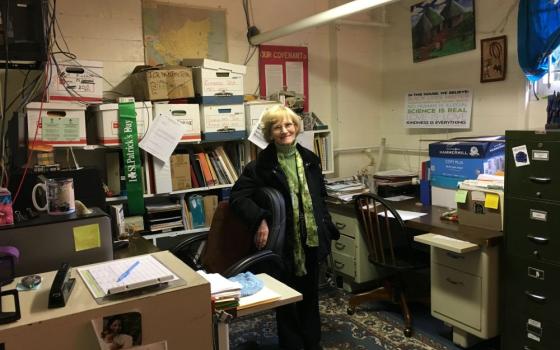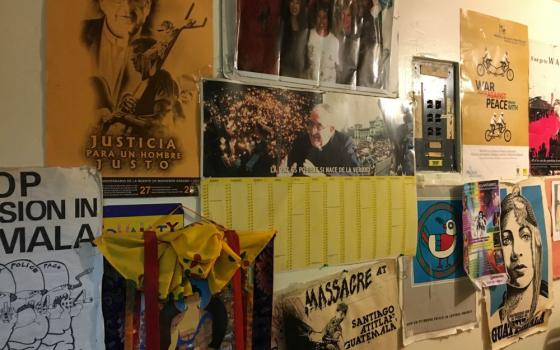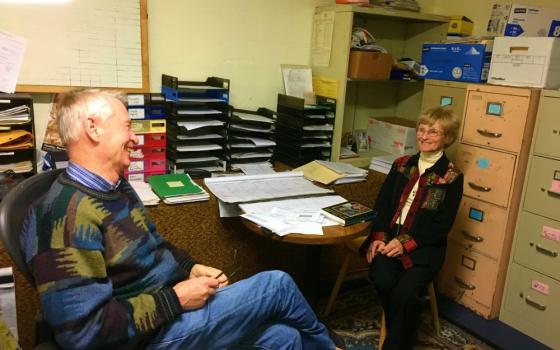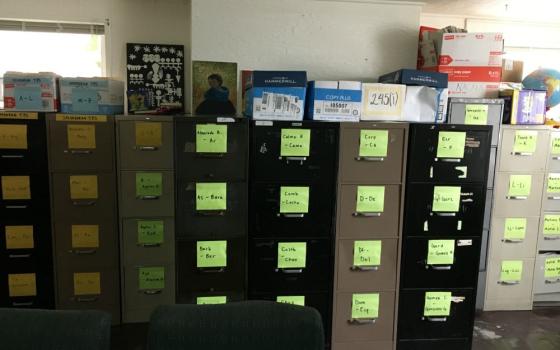For more than three decades, the subterranean level of Trinity United Methodist Church in Berkeley, California, is the place the East Bay Sanctuary Covenant has called home. Its simple red door at the bottom of a stairway has been the gateway to safe and secure passage into the United States for thousands of immigrants and refugees.
The lighting is poor, the floors cracked and peeling. The corridors, which feel like dungeons, lead to tiny offices, many of them windowless.
Yet despite its rundown environs, Franciscan Sr. Maureen Duignan, the organization's executive director, is deeply worried the program may soon lose this space.
"The church is slated to be sold to a developer," Duignan told GSR. "The plan is for the entire building to be razed to make room for a new housing complex."
Since 1982, the East Bay Sanctuary Covenant has been providing protection, advocacy and support to refugees and undocumented immigrants. The program works with the most marginalized populations fleeing violence and persecution, including unaccompanied minors, members of the LGBTQ community, and victims of torture, domestic violence and female genital mutilation.
For most of the organization's history, Duignan has sustained the spirit of the East Bay Sanctuary Covenant. Her dedication to refugees has earned her the respect of secular and religious leaders alike and the devotion of countless immigrant families.
"There is an Irish proverb: 'It is in the shelter of each other that people live,' " said Duignan, who was born in County Roscommon, Ireland, and immigrated to the United States in the 1970s to join the Sisters of St. Francis of Philadelphia.
"Our work here is an expression of sanctuary, which means giving refuge by getting into the depth of people's lives, listening to their stories, and offering them asylum," she said.
Though led by a woman religious, the East Bay Sanctuary Covenant is not a Catholic organization. It was founded by five churches, four Protestant and one Catholic, as part of the national sanctuary movement, a campaign created to aid Central American refugees caught in the throes of the policies of the Reagan administration.
"This is our contradiction in the U.S.: We support oppressive regimes, and yet we have been the most generous country in terms of receiving its refugees," said Michael Smith, refugee rights program coordinator at East Bay Sanctuary Covenant. "Then when they're here, we have our prejudice against them."
Originally trained as an anthropologist and archaeologist, Smith said he began to see the injustice of the wars while working on digs in Latin America. He joined East Bay Sanctuary Covenant as a part-time volunteer translator in 1984, the same year Duignan arrived after two years in refugee camps in Guatemala and El Salvador.
Back then, the organization only had four tiny rooms in the church basement, one of which Duignan and Smith shared. It is still Smith's office today.
"We had no money, one file cabinet and an IBM Selectric typewriter. The Z key didn't work, which is tricky when you're trying to type up Latin American names," Smith said.
The pair spent years fielding phone calls from detention centers and raising bond to aid in the release of immigrants from jail.
Duignan saw a growing need to help processing affirmative asylum claims, cases in which refugees are unable or unwilling to return to their home countries because of persecution "on account of race, religion, nationality, membership in a particular social group, or political opinion," according to the U.S. Refugee Act of 1980.
Asylum cases are classified as "affirmative" when the refugee has entered the U.S. but is not yet in immigration court. Once granted asylum, immigrants are protected from being deported to their home countries.
In 1992, the organization decided to shift its focus to affirmative asylum cases. That first year, they helped 11 people apply. Last year, they worked on more than 600 cases. They currently have 5,000 active clients, more than 1,000 of whom are part of the backlog of refugees waiting for an interview with an asylum officer. According to Berkeley Law, East Bay Sanctuary Covenant is one of the highest-volume providers of asylum representation in the country.
Though the majority of their clients come from Central America, other refugees have come to their door from nearly a dozen African nations, as well as Yemen, Afghanistan, Pakistan and China. In total, they have served individuals from 51 countries, with a special mission to indigenous Guatemalans who have fled genocide since the early 1980s. A large enclave of indigenous Guatemalans live in Berkeley as a result.
"EBSC has a high-energy, high-volume intensity, but there is also a very warm culture here," said Kaveena Singh, the organization's managing attorney. She started at the program in 2003 as an intern and returned in 2010 to take a full-time position.
Singh said the office's humble setting is beneficial to their clients.
"The lack of formality helps them feel comfortable and welcome and able to express themselves," she said. "They trust us. It reminds them of home."
Though East Bay Sanctuary Covenant works on a very small budget funded by private donations and grants, Smith said most of their services are provided pro bono or "low bono."
"If someone can't pay, we help anyway," he said. "If they can pay, we send them to a reputable low-fee attorney. We work with the poorest of the poor."
"Some of the poorest clients, the ones we didn't ask to pay, often come back with the biggest donations" after their cases are settled, Singh added.
The East Bay Sanctuary Covenant has managed its caseload primarily with the help of volunteers, including nearly 1,000 law students, most of whom study at University of California, Berkeley, and 97.5 percent of their clients have been granted asylum.
"We're a small pond with a big ripple effect," Smith said.
Once clients become asylees, their files are placed inside the drawers of one of the battered green metal filing cabinets banked in a corner of the basement. For Duignan, these cabinets are a kind of monument.
"I call this the joyful section," she said, waving her arms across the small expanse, her eyes smiling. She likens asylum to the Resurrection. "These people have suffered so much."
Since the election of President Donald Trump in 2016, that path to new life has been besieged with obstacles.
Since Trump took office, his administration has terminated the temporary protected status program for immigrants from El Salvador, Haiti, Honduras, Nicaragua, Sudan and Nepal. More than 800 of East Bay Sanctuary Covenant's clients fall under that program. Another 1,000 of their clients are currently protected under the Deferred Action for Childhood Arrivals program, which is also in political limbo.
In February, refugees streamed into East Bay Sanctuary Covenant's offices, seeking one last renewal on their temporary protected status, which would grant them a work permit and allow them to stay in the United States for another 18 months.
One Salvadoran woman who asked not to be identified sat in Duignan's office in a state of panic.
"I simply cannot go back," she said in Spanish. "The gangs have taken over my village. They extort money from us and threaten us constantly."
"Your morale goes down when something like this happens," Duignan said. "It is heartbreaking for us because we know so many of these people. They're our friends. We are personally involved with them, and they are so beautiful."
Morale sank even lower in June, when a ruling by Attorney General Jeff Sessions made it all but impossible for refugees to seek asylum based on domestic violence or gang violence.
"We have so many cases that fall into that category," Duignan told GSR in August.
Staff and volunteers have set up workshops for clients and intensive interviews with lawyers and paralegals to investigate whether they can use other remedies to make an asylum claim. For example, if an immigrant was a victim of a crime while in the United States and is helpful in the prosecution of the perpetrator, she or he could be a candidate for a U visa. However, there is a 10-year backlog for processing that kind of claim.
"It's very unsettling time for our clients, and most of them are already profoundly traumatized," Smith said.
For Manuel De Paz, East Bay Sanctuary Covenant's director of community development and education, the upheaval is an opportunity to empower the clients.
"We have developed a leadership training program targeted particularly at the TPS community," he said. "For the next year, we will be teaching them how to organize, how to do lobbying and how to speak in media."
De Paz, who joined the organization in 2006, was once a client with temporary protected status. In the 1980s, he fled his home in El Salvador after soldiers from the U.S.-backed Salvadoran military stormed his village.
"They killed three of my brothers," De Paz said. "One was decapitated, another was chopped into pieces. My 16-year-old sister, who was a catechist, was tortured."
De Paz tried to escape El Salvador twice by hiding in a cargo train hauling bananas but was captured both times. On his third attempt, he crossed the border and made his way to Berkeley.
Many of East Bay Sanctuary Covenant's thousands of clients have similar stories, and their faith and will to survive inspires the staff.
"We continue to do intakes and be as compassionate as we've always been. And we are moving forward in the hope that the policies will revert back once this administration is gone," Duignan said.
With so many asylum cases backlogged for years, that strategy might work for some clients. But for recent asylum applications, Sessions has implemented a last-in, first-out policy, meaning those who have made a claim most recently will now be first in line for a hearing and those in the backlog will be even further delayed.
All of these stresses on the program are only exacerbated by the looming reality that East Bay Sanctuary Covenant needs a new home. The building sits amid the sprawling campus of the University of California, Berkeley, a neighborhood that, like most of the Bay Area, has seen housing prices skyrocket in recent years.
"If we don't know where we're going to be or how much space we're going to have, we can't ethically keep doing as many cases," Smith said. "And if we don't have a good lead on a place by the end of this year, we may have to stop taking new asylum cases and just deal with the backlog."
These days, Duignan spends a lot of time talking with church and government leaders as well as administrators from educational institutions in the Berkeley area to see what possibilities there might be for a new space. So far, she has come up empty.
"We are a sanctuary in need of sanctuary," she said.
"We have always believed that the refugees are our guides," she added. "We will persevere because they have shown us how."
[Jamie Manson is a columnist and the books editor at the National Catholic Reporter.]






